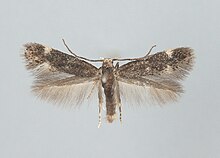Elachista humilis is a moth of the family Elachistidae found in most of Europe.
| Elachista humilis | |
|---|---|

| |

| |
| Scientific classification | |
| Domain: | Eukaryota |
| Kingdom: | Animalia |
| Phylum: | Arthropoda |
| Class: | Insecta |
| Order: | Lepidoptera |
| Family: | Elachistidae |
| Genus: | Elachista |
| Species: | E. humilis
|
| Binomial name | |
| Elachista humilis Zeller, 1850
| |
| Synonyms | |
|
List
| |
Description
editThe wingspan is 9–10 millimetres (0.35–0.39 in). Adults are on wing from May to July. There are two generations per year.The head is grey, face whitish. Forewings light grey irrorated with dark fuscous ; a very indistinct oblique whitish fascia before middle, usually partly or wholly obsolete ; a small tornal spot and larger triangular spot on costa somewhat beyond it ochreous-white.Hindwings are grey..[1]
Biology
editLarvae have been recorded on bent (Agrostis species), sweet vernal grass (Anthoxanthum odoratum), sedge (Carex species), tufted hairgrass (Deschampsia cespitosa), fescue (Festuca species), Yorkshire fog (Holcus lanatus), reed canary grass (Phalaris arundinacea) and smooth meadow-grass (Poa pratensis), but tufted hairgrass is the main hostplant. The other host plants are not all equally trustworthy because of possible confusion with Elachista canapennella.[2]
Distribution
editIt is found in most of Europe, except the Iberian Peninsula and the Balkan Peninsula.[3]
References
edit- ^ Meyrick, E., 1895 A Handbook of British Lepidoptera MacMillan, London pdf This article incorporates text from this source, which is in the public domain. Keys and description
- ^ "Elachista humilis Zeller, 1850 obscure dwarf". Plant Parasites of Europe. Retrieved 24 March 2020.
- ^ "Elachista (Elachista) humilis Zeller, 1850". Fauna Europaea. Retrieved 24 March 2020.
External links
edit